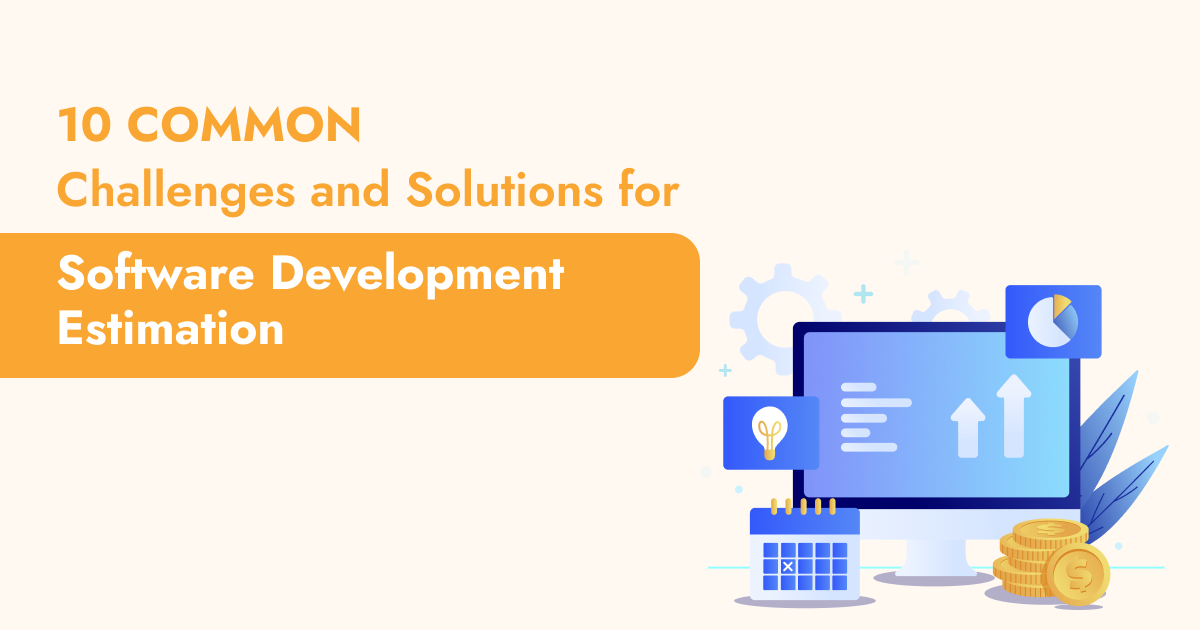 DA 70+ Guest Post Placements – Elite Authority at Your Fingertips!
DA 70+ Guest Post Placements – Elite Authority at Your Fingertips!
10 Common Challenges in Software Development Estimation and How to Overcome Them
Written by Anant Jain » Updated on: June 17th, 2025

Introduction
Estimating the time and resources required for software development projects is a critical aspect of the development life cycle. Accurate estimations help in project planning, budgeting, and resource allocation. However, software development estimation is a complex process that is often fraught with challenges.
In this blog, we will explore the importance of software development estimation, and delve into the ten common challenges that developers face in this realm, along with effective solutions to overcome them.
Why Software Development Estimation is Important?
Understanding why software development estimation matters is essential. Estimation forms the basis for planning, allocating resources, and setting budgets. It provides clarity to project managers, clients, and development teams about the project's scope, timelines, and potential risks. Accurate estimations support better decision-making, enhance transparency, and contribute to successful project outcomes.
Common Challenges in Software Development Estimation and Solutions
Estimating software development projects accurately can be a challenging task due to various factors. Here are 10 common challenges in software development estimation and strategies to overcome them:
1. Unclear Project Requirements
Challenge: Vague or changing requirements can lead to inaccurate estimations.
Solution: Conduct a thorough requirement analysis and establish clear communication channels with stakeholders. Embrace agile methodologies for adapting to changing requirements.
2. Lack of Historical Data
Challenge: Insufficient past project data hampers the accuracy of estimations.
Solution: Keep a repository of historical data, use estimation tools, and learn from past projects to refine future estimates.
3. Underestimating Complexity
Challenge: Complexity is often underestimated, leading to delayed timelines.
Solution: Break down the project into smaller tasks, assess complexity accurately, and involve the development team in estimation to gain diverse insights.
4. Overreliance on Expert Judgment
Challenge: Relying solely on expert opinions can lead to biased estimates.
Solution: Combine expert judgment with data-driven estimation methods and involve multiple stakeholders for a more comprehensive perspective.
5. Scope Creep
Challenge: Changes in project scope during development can disrupt initial estimates.
Solution: Implement robust change control processes, communicate changes clearly, and re-estimate based on adjusted scope.
6. Inadequate Communication
Challenge: Poor communication between team members and stakeholders affects estimation accuracy.
Solution: Foster open communication, conduct regular status meetings, and ensure that everyone involved understands the project's goals and constraints.
7. Team Skill Variability
Challenge: Variability in team members' skills can impact estimation consistency.
Solution: Regularly assess and enhance team skills, involve experienced members in estimation, and use estimation tools that consider skill levels.
8. External Dependencies
Challenge: Dependencies on external factors, such as third-party APIs, can disrupt timelines.
Solution: Identify and track external dependencies early, communicate with third parties effectively, and have contingency plans for potential delays.
9. Inadequate Time for Estimation
Challenge: Rushed estimation processes lead to inaccuracies.
Solution: Allocate sufficient time for estimation, involve relevant team members, and prioritize a detailed estimation phase in project planning.
10. Overlooking Risks
Challenge: Failure to account for potential risks can result in unexpected delays.
Solution: Conduct thorough risk analysis, include buffers in estimates for unforeseen issues, and regularly revisit risk assessments throughout the project.
In conclusion, successfully estimating software development projects is a crucial element of efficient project management. Recognizing and tackling common challenges in estimation enhances accuracy, improving project planning, resource management, and overall success. A proactive, collaborative approach to software development estimation is crucial for reliable outcomes and effective management of project complexities.
Note: IndiBlogHub features both user-submitted and editorial content. We do not verify third-party contributions. Read our Disclaimer and Privacy Policyfor details.
Copyright © 2019-2025 IndiBlogHub.com. All rights reserved. Hosted on DigitalOcean for fast, reliable performance.









